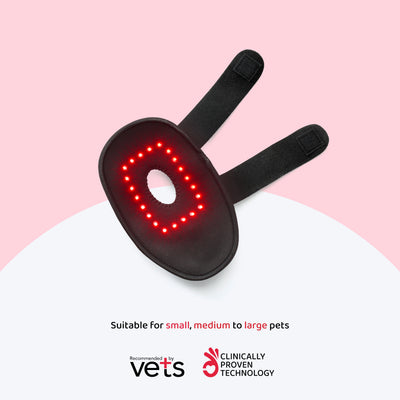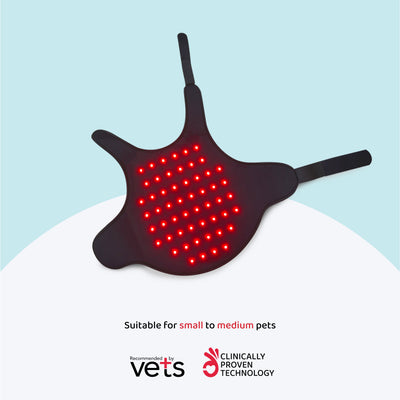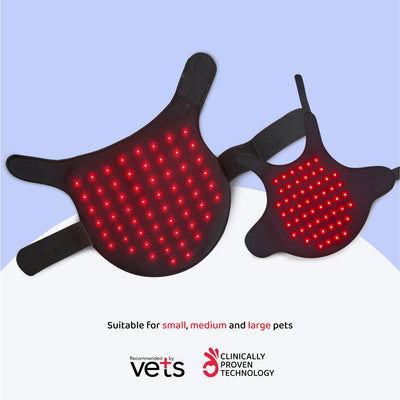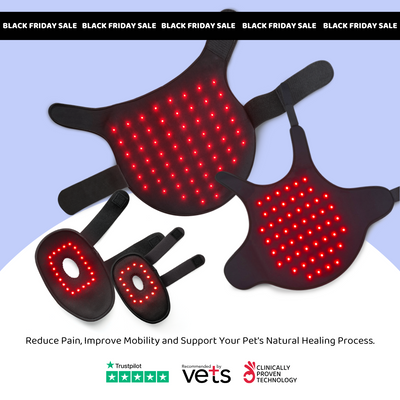If your pet has recently been diagnosed with arthritis, you might be feeling like life is taking a downturn for your furry friend. However, it's essential not to resign your pet to a sedentary lifestyle. You can play a crucial role in ensuring your beloved pet lives life to the fullest despite arthritis, by managing their pain and maintaining their mobility.
What is Arthritis?
Arthritis is a common occurrence in older pets, but can start early in some. It is reported that over 80% of dogs over 8yrs old have arthritis. ‘Osteoarthritis’ is particularly prevalent, also known as Degenerative Joint Disease (DJD). This particular form of arthritis is frequently observed.
When a dog has osteoarthritis, the cartilage which cushions their joints gradually deteriorates. As the cartilage wears thin, inflammation, fluid, and bone spurs develop. Inflammation, fluid, and bone spurs are the reason for the severe pain. For dogs, arthritis affects the hips, knees, elbows, and lower back most often.
Early diagnosis by your Vet is paramount for achieving the best possible outcome and enhancing the comfort of your pet. Detecting arthritis in its early stages is particularly beneficial, as it allows for timely intervention to prevent or slow down the degeneration of your beloved furry companion's joints.
While many of us cherish our dogs as if they were human, it's crucial to recognize that they can’t communicate their pain in the same way we do. Consequently, we may overlook signs of suffering in our older pets, making it essential to be proactive in identifying and treating potential issues.
What are the signs?
- Stiffness
- Difficulty getting up in the morning and after naps
- Reduced interest in walks and playing
- Hesitation or difficulty getting in and out of the car or on and off your couch
- Lameness or limping
- Avoiding slippery surfaces
As arthritis progresses, the signs become more pronounced. Here are indicators of more advanced arthritis and distress in dogs:
- Panting, pacing, and restlessness
- Whining or whimpering
- Irritability
- Loss of appetite
- Lethargy
- Swollen joints
- Reduction in muscle mass
There are proactive steps you can take to reduce the likelihood of your dog developing painful arthritis as they age. While it's not possible to completely eliminate the risk, you can slow down the progression and minimise the severity of the disease. The primary goal is to prevent or impede the deterioration of your dog's joints. As with humans, a multi-modal approach to healthcare is key.
What can I do to help my pet?
Improve their diet: Provide a balanced and nutritious diet tailored to your dog's needs.
Monitor and maintain a healthy weight: Evaluate your dog's weight regularly and help them maintain an optimal weight.
Regular exercise: Incorporate regular walks into your routine to promote joint health, but not excessive exercise.
Prevent high-impact activities: Avoid letting your dog jump down from elevated places or pound on hard surfaces.
Prompt veterinary attention: Seek immediate veterinary care if your dog sustains an injury.
Supplements: Provide nutritional supplements to support joint health.
Alternative Therapies: Consider chiropractic care, acupuncture, massage, Red Light Therapy (RLT) using HeaLED or laser, and Hydrotherapy.
Surgery: In severe cases, surgical intervention may be necessary.
Medications: If other options don't provide relief, medications may be prescribed, but it's essential to be aware of potential side effects and closely monitor your dog.
Senior dogs often experience more side effects from medications, so understanding the pros and cons is crucial. Additionally, be cautious with over-the-counter (OTC) medications, natural drugs, and supplements to ensure they do not negatively impact your pet's health.
HeaLED Therapy Wraps offer a home-based alternative for pain relief, delivering healing on a cellular level, treating large areas, and promoting self-healing. Consider this option to provide your loyal old friend with the relief they deserve from painful arthritis.
Other Resources
CAM - Canine Arthritis Management. A helpful resource for managing arthritis and recognising the subtle signs.
Please feel free to reach out to our team for more information and advice - you can get in touch with us here or by using the live chat.








